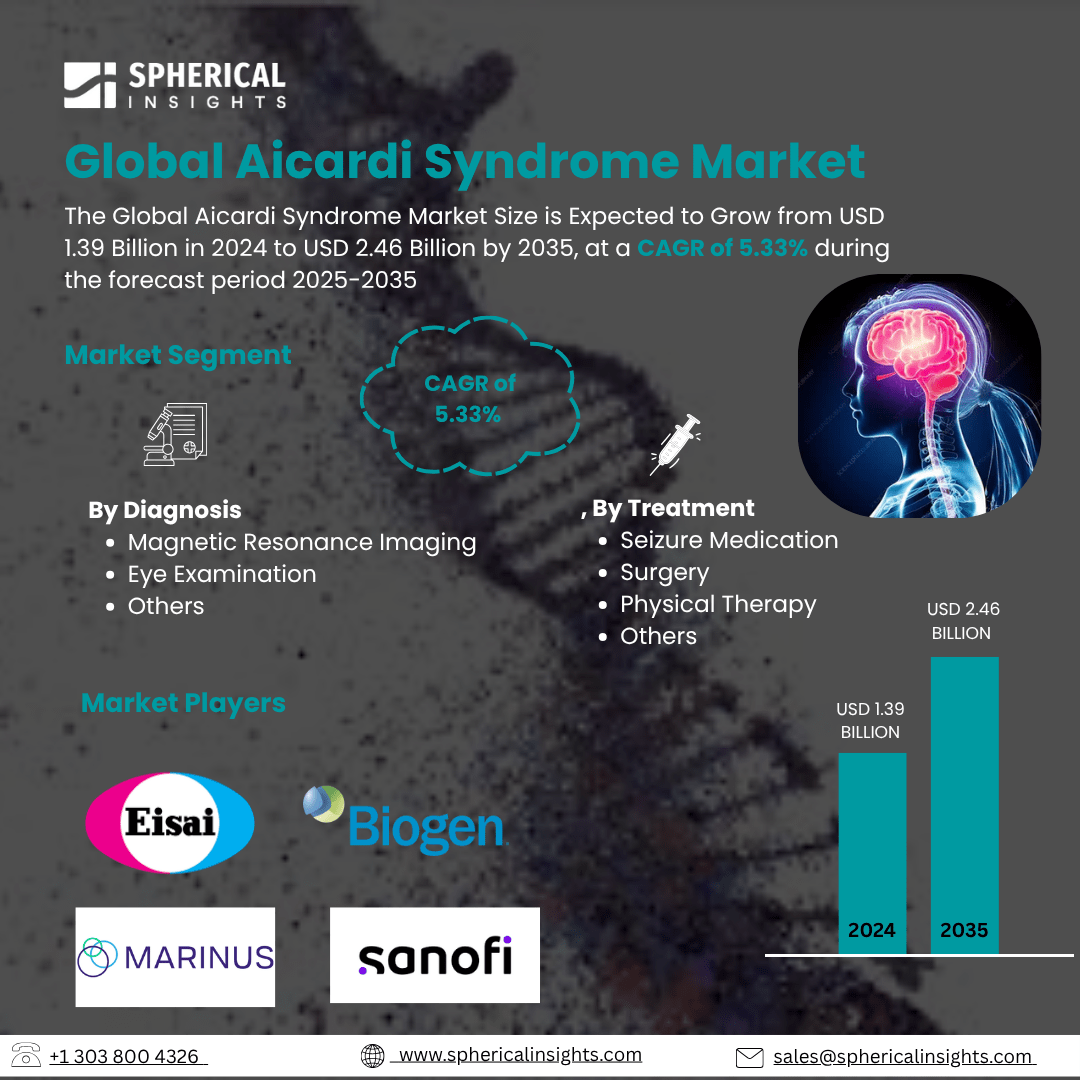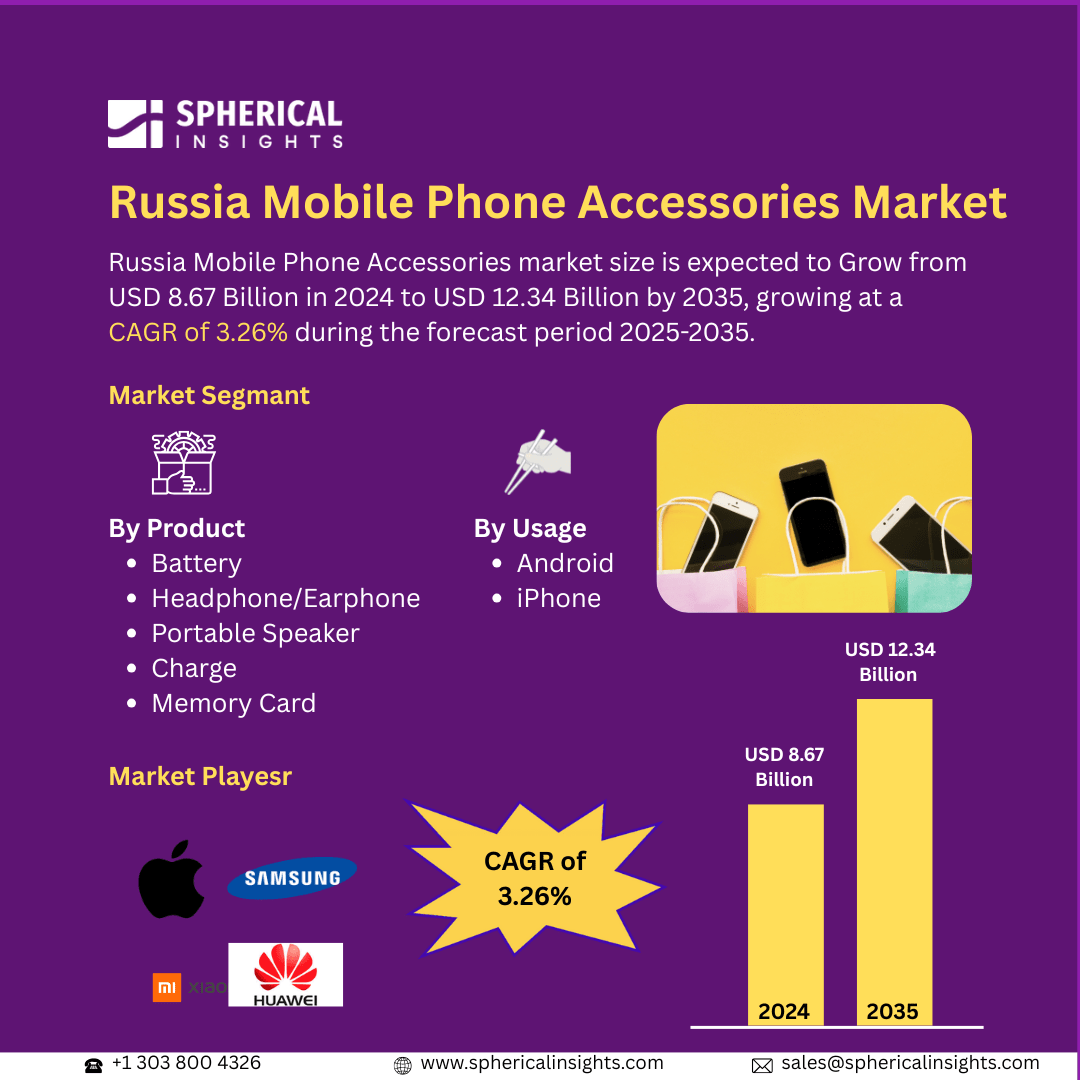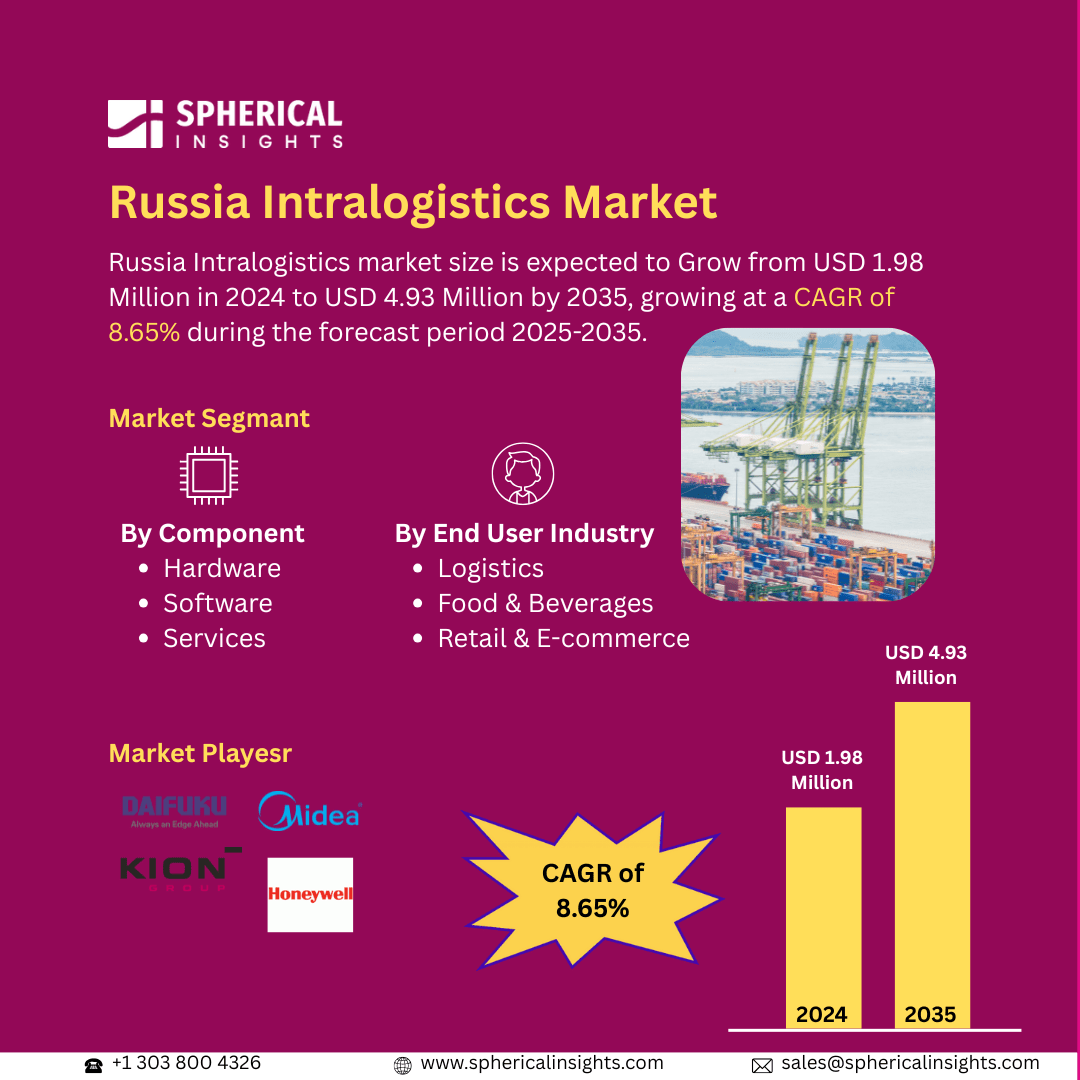- As per Spherical Insights & Consulting, The Global Aicardi Syndrome Market Size is Expected to Grow from USD 1.39 Billion in 2024 to USD 2.46 Billion by 2035, at a CAGR of 5.33% during the forecast period 2025-2035, owing to the launch of new therapies in the market and the rise in the number of cases.
- The leading Aicardi Syndrome Market Companies such as Pfizer, Novartis, UCB Pharma, Johnson & Johnson, GlaxoSmithKline, Sanofi, Lundbeck, Eisai Co., Roche, Teva Pharmaceuticals, Zogenix, AbbVie, GW Pharmaceuticals, Biogen, Marinus Pharmaceuticals, and Others.
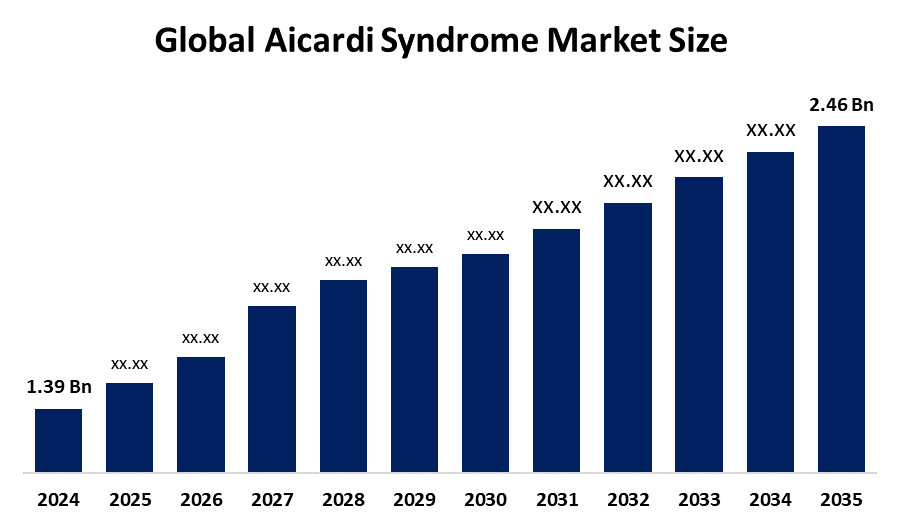
Aicardi Syndrome Treatment Market: Understanding and Treatment Algorithm:
Aicardi Syndrome is a rare genetic neurological disorder primarily affecting females. It is characterized by the absence of the corpus callosum, seizures, and distinctive retinal abnormalities. This condition leads to developmental delays, intellectual disability, and epilepsy, requiring multidisciplinary care for symptom management and improved quality of life.
Aicardi Syndrome Diagnosis:
Aicardi Syndrome diagnosis involves clinical evaluation, brain imaging like MRI to detect the absence of the corpus callosum, and eye examinations to identify characteristic retinal abnormalities. Genetic testing may support diagnosis, but it mainly relies on identifying key symptoms such as seizures and developmental delays in infants and young children.
Aicardi Syndrome Treatment:
Treatment for Aicardi Syndrome focuses on managing symptoms, primarily through antiepileptic medications to control seizures. Supportive therapies such as physical, occupational, and speech therapy aid developmental progress. In some cases, surgery may be considered for seizure control. Comprehensive care involves a multidisciplinary approach to improve patient quality of life.
Aicardi Syndrome Epidemiology
The disease epidemiology covered in the report provides historical as well as forecasted epidemiology segmented by Total Diagnosed Incident Population of Aicardi Syndrome, Gender specific Diagnosed Incidence of Aicardi Syndrome, Type specific Diagnosed Incidence of Aicardi Syndrome, Age specific Diagnosed Incidence of Aicardi Syndrome, Diagnosed Incident Population based on Primary Site of Aicardi Syndrome, and Diagnosed Incident Population based on Histologic Classification of Aicardi Syndrome Tumour in the global market covering North America, Europe, Asia-Pacific, Latin America, the Middle East, and Africa from 2024 to 2035.
Principal Insights
This section offers a global overview of Aicardi syndrome epidemiology in major markets worldwide.
Country Wise- Aicardi Syndrome Multiforme Epidemiology
- The epidemiology segment provides Aicardi Syndrome prevalence data and findings across key regions worldwide, including North America, Europe (Germany, France, Italy, Spain, and the United Kingdom), Asia-Pacific (including Japan), Latin America, the Middle East, and Africa.
Aicardi Syndrome Recent Developments:
- In November 2024, Immune Sensor Therapeutics announced that the U.S. FDA granted Orphan Drug and Rare Pediatric Disease Designations to its lead cGAS inhibitor, IMSB301, for treating Aicardi-Goutières Syndrome (AGS). The company is conducting a Phase 1 trial in healthy volunteers and plans to initiate Phase 1b/2 studies in AGS and other cGAS-driven diseases.
Aicardi Syndrome Marketed Drugs:
Keppra (levetiracetam) is a broad-spectrum antiepileptic drug used to control seizures in Aicardi Syndrome patients. It is known for its favourable side effect profile and is commonly prescribed for infantile spasms and myoclonic seizures.
- Topamax: Johnson & Johnson
Topamax (topiramate) is an anticonvulsant that blocks sodium channels and enhances GABA activity. It is often used in children with Aicardi Syndrome to reduce seizure frequency and severity, helping improve neurological stability and daily functioning.
Aicardi Syndrome: Emerging Therapies:
- GSX 521: It is a gene therapy candidate under early development targeting X-linked mutations associated with Aicardi Syndrome. It uses viral vector delivery to restore function in affected neural pathways, aiming to reduce seizure severity and support early neurodevelopment.
- NEU 217: It is a neurosteroid modulator being explored for intractable epilepsy syndromes, including Aicardi Syndrome. It enhances GABAergic signaling to reduce seizure activity and is currently in preclinical evaluation for pediatric patients with genetic epileptic encephalopathies.
Aicardi Syndrome Market Outlook
- The Aicardi Syndrome market includes diagnostic technologies and therapeutic interventions designed to manage this rare genetic neurological disorder. It involves seizure control, developmental support, and vision care. The market covers medications, imaging, surgical options, and rehabilitation aimed at improving patient outcomes and quality of life.
- Rising awareness of rare pediatric neurological disorders, improved access to advanced diagnostic tools like MRI, and increasing use of antiepileptic drugs are key market drivers. Enhanced research interest and growing availability of multidisciplinary care teams further support the market’s ongoing development and early diagnosis efforts.
- Opportunities lie in developing targeted therapies, pediatric neurorehabilitation devices, and precision diagnostic platforms. Expanded newborn screening, AI-assisted imaging analysis, and digital monitoring for seizure activity present new frontiers. Pharmaceutical innovation and gene therapy research also offer hope for improved long-term outcomes in this rare disorder.
- Governments are encouraging rare disease management through orphan drug policies, research grants, and rare disease registries. National health agencies are expanding access to diagnostic services and incentivizing the development of pediatric therapies to improve care for conditions like Aicardi Syndrome, especially in underserved populations.
- Limited disease-specific treatments and delayed diagnosis due to rarity hinder optimal care delivery.
- The market is expected to grow steadily due to increasing diagnostic awareness and support for rare disease research.
Aicardi Syndrome Market Segmentation
By Diagnosis:
- Magnetic Resonance Imaging
- Eye Examination
- Others
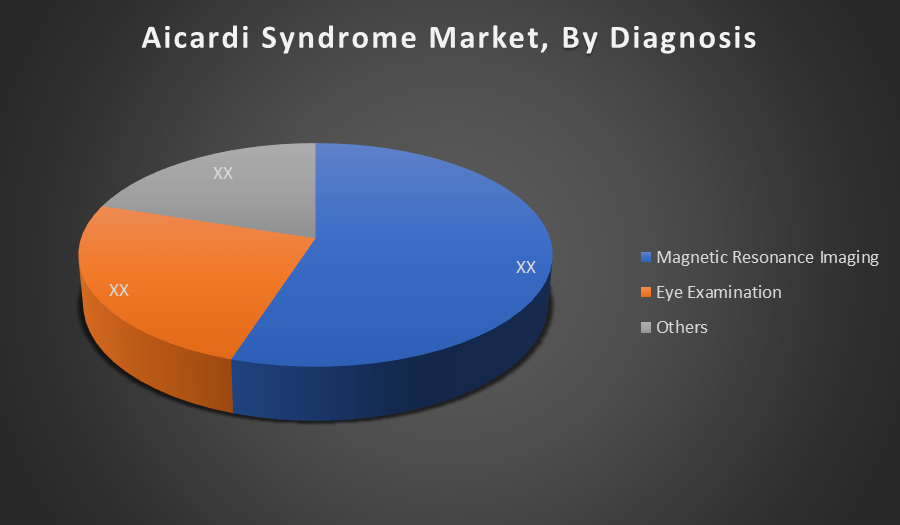
Magnetic Resonance Imaging (MRI) holds the largest market share in the diagnosis segment due to its critical role in identifying corpus callosum malformations, a hallmark of Aicardi Syndrome. MRI provides detailed brain imaging essential for early and accurate diagnosis, making it the most relied upon and frequently used diagnostic tool.
By Treatment:
- Seizure Medication
- Surgery
- Physical Therapy
- Others
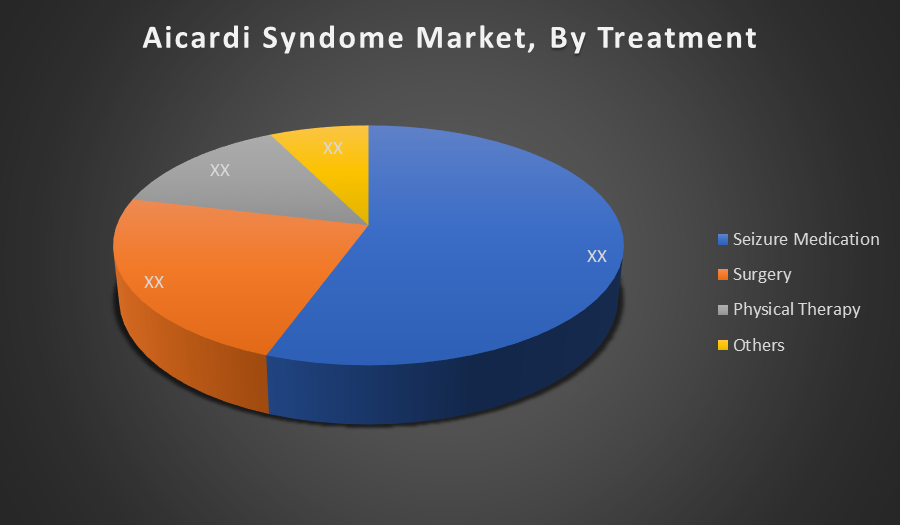
Seizure Medication dominates the treatment segment as managing seizures is the primary concern in Aicardi Syndrome care. Antiepileptic drugs are typically the first line of intervention to reduce seizure frequency and severity, improve neurological outcomes, and enhance the patient’s overall quality of life, making them widely prescribed and essential.
Regional Segment Analysis of the Aicardi Syndrome Market
North America holds the largest share in the Aicardi Syndrome market due to its advanced healthcare infrastructure, early adoption of diagnostic imaging like MRI, and strong presence of pediatric neurology specialists. The region benefits from active rare disease research programs, access to off-label antiepileptic drugs, and favourable reimbursement policies. Additionally, high awareness among healthcare professionals and support from rare disease organizations contribute to effective diagnosis and long-term management.
Asia-Pacific is emerging as the fastest-growing region in the Aicardi Syndrome market, driven by improving healthcare infrastructure, increased awareness of rare pediatric disorders, and growing investments in neurodiagnostic technologies. Countries like China and India are expanding access to MRI facilities and pediatric neurological care. Government backed rare disease policies, expanding clinical trial networks, and international collaborations are further accelerating diagnosis and treatment adoption in this underserved but rapidly developing region.
Aicardi Syndrome Market Key Companies
- Pfizer
- Novartis
- UCB Pharma
- Johnson & Johnson
- GlaxoSmithKline
- Sanofi
- Lundbeck
- Eisai Co.
- Roche
- Teva Pharmaceuticals
- Zogenix
- AbbVie
- GW Pharmaceuticals
- Biogen
- Marinus Pharmaceuticals
- Others
Aicardi Syndrome Therapeutics Market Report Scope
- The Aicardi Syndrome therapeutics market report provides a detailed overview, covering its causes, symptoms, disease progression, and existing treatment options.
- Detailed insights into Aicardi Syndrome’s epidemiology and therapeutic approaches are included.
- Additionally, a comprehensive review of existing and emerging Aicardi Syndrome therapies is provided, including an evaluation of new treatments expected to influence the current Aicardi Syndrome treatment market landscape.
- The report includes a detailed review of the Aicardi Syndrome therapeutics market, both historical and forecasted, highlighting the global drug reach.
- The Patient-Based Aicardi Syndrome Market Forecasting report offers valuable insights into trends shaping the global Aicardi Syndrome market, helping to develop effective business strategies.
Aicardi Syndrome Treatment Market Report Insights
- Forecasting Market Trends Based on Patient Data and Disease Rates
- Aicardi Syndrome Therapeutic Approaches in Aicardi Syndrome
- Review Of Drugs in Development for Aicardi Syndrome
- Market, Growth, and Trends in Aicardi Syndrome
- Market Opportunities in Aicardi Syndrome Treatment
- Effects Of Future Therapies on Aicardi Syndrome Treatment.
Aicardi Syndrome Treatment Market Report Key Strengths
- 15 Years Aicardi Syndrome Market Forecast
- Global Coverage
- Aicardi Syndrome Epidemiology Segmentation
- Key Cross Competition
Aicardi Syndrome Treatment Market Report Assessment
- Present Practices in the Aicardi Syndrome Treatment Market
- Review of Investigational Aicardi Syndrome Drugs
- Attractiveness of the Aicardi Syndrome Drug Market
- Aicardi Syndrome Market Drivers
- Aicardi Syndrome Market Barriers
- SWOT
- Attribute Analysis
Market Segment
This study forecasts revenue at the global, regional, and country levels from 2020 to 2035. Spherical Insights has segmented the Aicardi syndrome market based on the below-mentioned segments:
Global Aicardi Syndrome Market, By Diagnosis
- Magnetic Resonance Imaging
- Eye Examination
- Others
Global Aicardi Syndrome Market, By Treatment
- Seizure Medication
- Surgery
- Physical Therapy
- Others
Global Aicardi Syndrome Market, By Regional Analysis
- North America
- Europe
- Germany
- UK
- France
- Italy
- Spain
- Russia
- Rest of Europe
- Asia Pacific
- China
- Japan
- India
- South Korea
- Australia
- Rest of Asia Pacific
- South America
- Brazil
- Argentina
- Rest of South America
- Middle East & Africa
- UAE
- Saudi Arabia
- Qatar
- South Africa
- Rest of the Middle East & Africa
